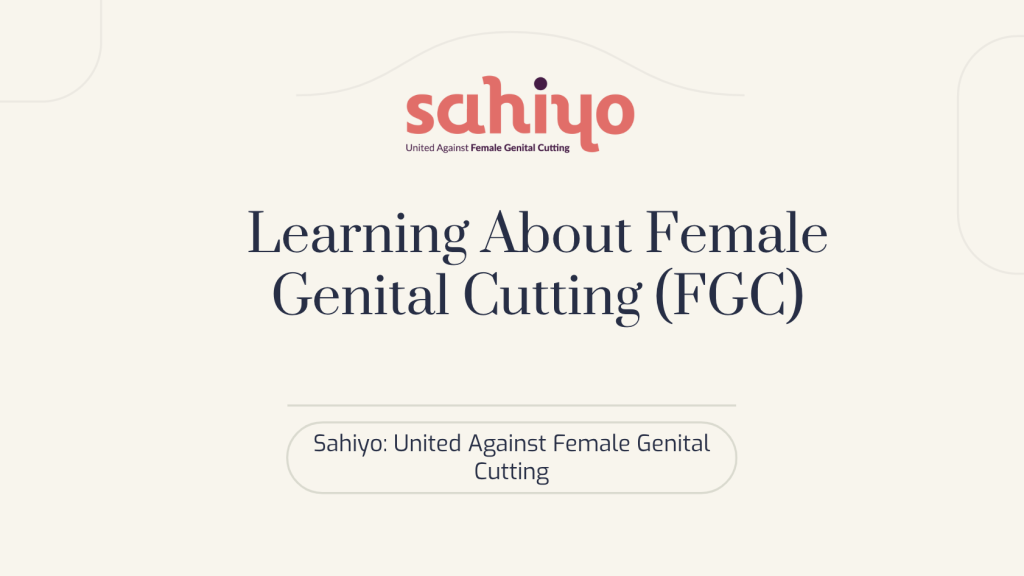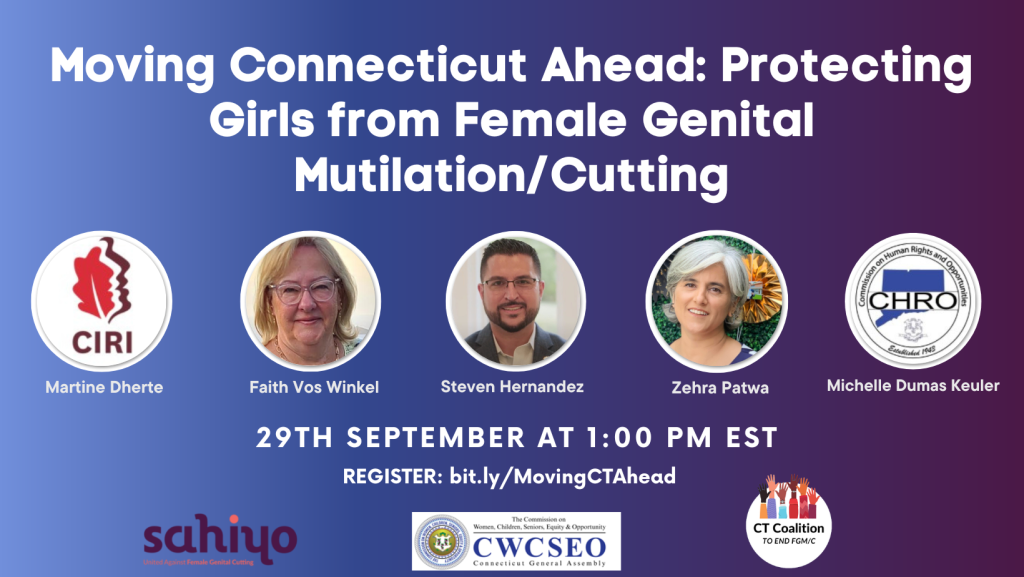Sahiyo presents at the Mitchell Hamline School of Law in Minnesota

On November 2nd, Sahiyo Programs Coordinator Catherine Cox and current volunteer (as well as former Development Assistant) Sarrah Hussein partnered on a presentation for a class at the Mitchell Hamline School of Law in Minnesota on the topic of female genital mutilation/cutting (FGM/C). The presentation included some background on what FGM/C is, it’s prevalence in the U.S., and some legal background in the United States. More specifically, they introduced some of Sahiyo’s past legal work in Massachusetts, and current work to get a comprehensive state-wide law passed in Connecticut . To learn more about Sahiyo’s community education and outreach programs, visit this page on our website.
Reflecting on ‘Moving Connecticut Ahead: Protecting Girls from FGM/C’, a webinar

By Meg Sinnott On September 29th, Sahiyo partnered with The CT Coalition to End FGM/C and The Commission on Women, Children, Seniors, and Equitable Access for All to host Moving Connecticut Ahead: Protecting Girls from FGM/C. This webinar was held to inform legislators, community members, and other stakeholders on the issue of female genital cutting (FGC) and how it impacts girls in the state. Connecticut (CT) remains one of the ten states in the U.S. with no legal protections against FGC. The webinar brought together key individuals living in the state of CT to discuss their reasons for supporting the passage of a law to end the social norm of FGC. Panelists included: Steven Hernandez – The Commission on Women, Children, Seniors, Equity & Opportunity Zehra Patwa – WeSpeakOut Michelle Dumas Keuler – Connecticut Commission on Human Rights and Opportunity Faith Vos Winkel – Connecticut Office of the Child Advocate Martine Dherte – Connecticut Institute for Refugees and Immigrants As a participant of the webinar, I thought that the panelists conveyed their message very effectively and eloquently: CT needs to adopt anti-FGC legislation now. As a former CT resident myself, I was shocked when I first found out that CT does not have a law already. A 2013 Population Reference Bureau study found that 2,658 women and girls in CT are at risk of undergoing or have already undergone FGC. For me, earlier feelings of shock have concretized into a need to take action, which includes helping to facilitate this webinar. I am very proud of the work that is being done by CT advocates, allies, and survivors to amplify awareness of FGC and its impacts, so that lasting change can be made. From conversations I have had with friends and family who live in CT, I’ve observed an assumption that somewhere like CT would not need legislation against FGC; this is due to the misconception that FGC only happens overseas, such as in countries within Africa and Asia. It was also surprising to hear that CT is so far behind other states in terms of protecting the rights of girls and other people using legislation since gender equity is a key priority for the state. In fact, US News & World Report recently lauded CT for its achievements on this issue, especially when it comes to equal access to economic opportunities. But even economic equity is limited when we don’t have the full participation of all of our women and girls. FGC reflects and perpetuates a broader trend of gender inequality. Zehra Patwa, a survivor of FGC and member of the Dawoodi Bohra community, spoke to the social norm piece of FGC through her discussion of how legislation could impact the prevalence of FGC in the Bohra community, which is one that abides by the law of the land and prioritizes the law before traditional practices. She demonstrated the universal truth that every society is influenced by norms that guide behavior and can help to solidify what conduct is acceptable or unacceptable within the group. Individuals may be socially sanctioned for not following social norms, which has been seen in instances of survivors and activists of FGC speaking out against the practice. Michelle Dumas Keuler explained how laws and policies that are shaped by our culture protect human rights, clarifying that CT needs anti-FGC laws (despite the existing federal law) to make prosecution more accessible, as well as to communicate to the wider community that CT is a state that values its girls and protects its citizens from harm. Faith Vos Winkel helped shed light on the impact that laws can have on a community. She expressed that every society has harmful social norms: not too long ago in the U.S. hitting children was considered acceptable. Domestic violence between a husband and a wife was legally permissible up until the 1970s, and it was considered a private matter. One takeaway I had from the webinar was that our knowledge of harmful norms has evolved, and so too has legislation in CT evolved in order to support ending these other harmful practices. The panel discussion made clear to me that in order to truly make an impact, we must support a holistic or multifaceted approach to address FGC, as we have for other harmful social norms like domestic violence, by writing advocacy and educational opportunities into the law. Watch the recording of this webinar here.
Moving Connecticut ahead: Protecting girls from Female Genital Mutilation/Cutting

Date: Sep 29, 2022 Time: 1 PM to 2:30 PM EST (90 mins) Registration Link: bit.ly/MovingCTAhead In partnership with the Connecticut Commission on Women, Children, Seniors, Equity and Opportunity and The Connecticut Coalition to End Female Genital Mutilation/Cutting (FGM/C), Sahiyo will be hosting “Moving Connecticut Ahead: Protecting Girls FGM/C. In 2013, the Population Reference Bureau estimated that 2,658 women and girls in Connecticut (CT) were at risk of undergoing – or having already undergone – female genital mutilation/cutting (FGM/C). FGM/C is a harmful social norm practiced worldwide and the United Nations has declared it a human rights violation. In Connecticut, many other human rights violations stemming from social norms have been addressed through legislation such as human trafficking, child marriage, and conversion therapy. However, Connecticut has yet to address the issue of FGM/C and remains one of 10 U.S. states without any state-level law protecting future generations from this harm. This webinar will explore how Connecticut can move forward to address this issue through legislation to better protect its women and girls from FGM/C. Get to know the panel! Moderator: Steven Hernández Steven Hernández, Esq Executive Director CT Commission on Women, Children, Seniors, Equity and Opportunity CT General Assembly Steven Hernández, Esq. is the Executive Director of the CT Commission on Women, Children, Seniors, Equity and Opportunity, a non-partisan agency of the Connecticut General Assembly. At the Commission, Mr. Hernández serves as the legislative lead for the State’s 2GEN initiative, an approach that puts family at the center of improved community outcomes, and as drivers of long-term economic success. Mr. Hernández proudly serves on several volunteer boards and commissions rooted in public service. He previously served the CT state legislature as Director of Public Policy and Research for the Connecticut Commission on Children. Prior to joining the Commission, Mr. Hernández served seven years as legislative and budget director in the office of Washington, D.C., Council member Jim Graham. Mr. Hernández served as a clerk to two judges in the District’s Court of Appeals and as a consultant to the Washington law firm Baker & Miller, PLLC. He received a Bachelor of Arts Degree from Bennington College in Vermont in 1995 and a Juris Doctor Degree from the Washington College of Law at American University. Speakers: Zehra Patwa Zehra Patwa is the Co-Founder and US Lead of WeSpeakOut, an organization that strives to work for equal rights for Bohra women in all spheres of life, specifically, on Female Genital Mutilation/Cutting (FGM/C) or khafz. She grew up in London and was educated at the University of Bradford Management Centre in the UK and the Université de Montpellier in France. Zehra serves on several Boards, including Integrated Refugee and Immigrant Services (IRIS), and currently serves as Vice-Chair of the Sahiyo US Advisory Board. After discovering well into adulthood, that khatna or khafz (type 1 FGM/C) was practiced in her community and that she, too, had been subjected to it, she decided she could no longer keep silent. Although she has no recollection of the practice being done to her, she is vehemently opposed to it and has been working with WeSpeakOut to expose the practice within, and outside, the community. She currently works in Digital Customer Delivery for the Knights of Columbus in New Haven, Connecticut. Faith Vos Winkel Before Faith’s recent retirement from Government, Faith Vos Winkel began her work with the Office of the Child Advocate in July 2001 and assists the Child Advocate to fulfill her statutory mandates including overseeing the systems of care and protection for children in Connecticut and advocating for their well-being. Faith’s primary responsibilities focus on the review of all unexpected and unexplained child deaths in Connecticut. She is responsible for preparing child fatality cases and conducting comprehensive investigations. Faith represents the Child Advocate on a variety of statewide policy committees including the Suicide Advisory Board, CT Coalition Against Domestic Violence Fatality Review Committee, and the Governor’s Task Force on Justice for Abused Children. Ms. Vos Winkel has an undergraduate degree from the University of Connecticut and a Masters of Social Work from the University Of Connecticut. Martine Dherte Martine Dherteis the Program Manager for refugee services at the Connecticut Institute for Refugees and Immigrants. She uses her platform to educate newly arrived refugees resettled by her organization in Bridgeport. She would like her programs, which currently includes GBV services to address FGM and become a stronger advocate in the field. She is passionate about protecting women and girls from all forms of abuse. Michelle Dumas Keuler Michelle Dumas Keuler is the Managing Director of the Housing, Training and Appeals divisions of the Legal Division and Commission Counsel with the State of Connecticut Commission on Human Rights and Opportunities (“CHRO”). Founded in 1943, the CHRO is the nation’s oldest state based civil rights organization. The Commission is charged with investigating and prosecuting cases of employment, housing, public accommodation and credit discrimination. As a Managing Director, Ms. Dumas Keuler represents the agency in its prosecution of employment, housing and public accommodation discrimination cases before agency Human Rights Referees, in state court, and federal court. Ms. Dumas Keuler has extensive experience training in the areas of housing, employment and public accommodation discrimination, employer best practices and sexual harassment discrimination. She has trained countless landlords, tenants, housing authorities, state and municipal employees and employers regarding discrimination statutes and their enforcement by the CHRO. Ms. Dumas Keuler also works on policy for the Commission and is active in promoting the legislative initiatives of the agency.
Moving Connecticut ahead: Protecting girls from FGM/C

Date: Thursday, September 29, 2022 Time: 1:00 PM EST Registration Link: bit.ly/MovingCTAhead This webinar, sponsored by Sahiyo, The Connecticut Coalition to End Female Genital Mutilation/Cutting, and the Connecticut Commission on the Status of Women, Children, Seniors, Equity and Opportunity, will explore ideas on how to change harmful social norms like female genital mutilation/cutting (FGM/C) through policy and legal methods. 40 other states have passed legal protections to address this harmful practice, yet Connecticut remains an outlier. The panelists for this event include Zehra Patwa, Co-Founder of WeSpeakOut, Michelle Dumas Keuler, Human Rights Attorney with the State of Connecticut Commission on Human Rights and Opportunities, and Faith Vos Winkel, who was formerly at the Office of the Child Advocate. The webinar will be moderated by Steven Hernandez, Executive Director for the Commission on Women, Children, Seniors, Equity, and Opportunity.
The Connecticut Coalition to End FGM/C speaks with the Hartford Times

Within the U.S., there are currently 10 states without any laws in place to protect girls from Female Genital Mutilation/Cutting (FGM/C); Connecticut is one of those states. Since 2021, the Connecticut Coalition to End FGM/C has been working to build holistic solutions for supporting survivors and preventing future generations of girls from experiencing FGM/C in the State of Connecticut. The Coalition is made up of a diverse range of stakeholders, who advocate for comprehensive legislation to protect girls from FGM/C, provide survivors with support services, raise awareness of the harm FGM/C causes, and educate frontline professionals on how to provide culturally specific and sensitive care. In June 2022, CT Coalition members Mariya Taher of Sahiyo and Steven Hernandez of theCT Commission on Women, Children, Seniors, Equity & Opportunity hosted a conversation to discuss women’s bodily autonomy and FGM/C, to further raise awarenss of this issue within the state. Listen to their conversation here.
